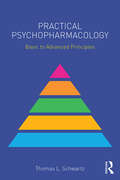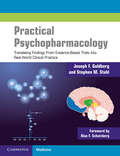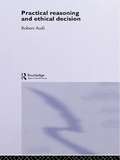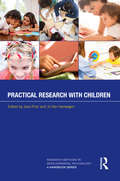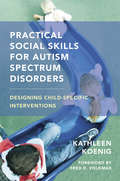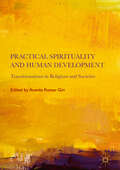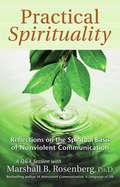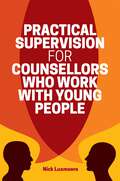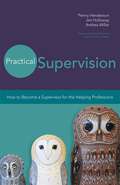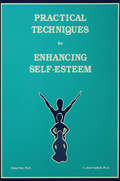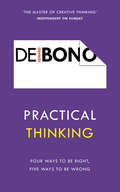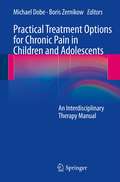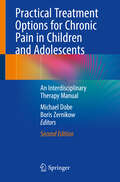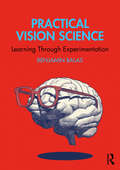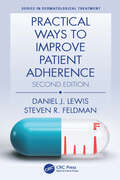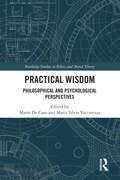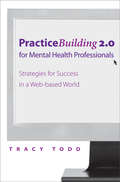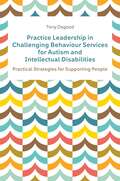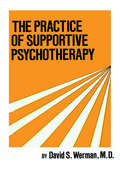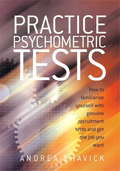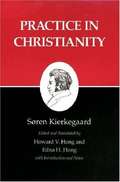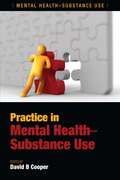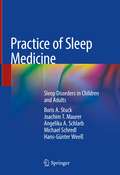- Table View
- List View
Practical Psychopharmacology: Basic to Advanced Principles (Clinical Topics in Psychology and Psychiatry)
by Thomas L. SchwartzPractical Psychopharmacology takes the novel approach of writing at three different levels—beginning, intermediate, and advanced—to give the practicing psychopharmacologist a tailored experience. Each chapter focuses on a specific DSM-5 disorder and outlines abbreviated treatment guidelines to help the reader understand where their knowledge base and clinical practice currently resides. At the first level, the book teaches novice prescribers practical diagnostic skills and provides a brief overview of pertinent genetic and neuroimaging findings to increase prescribing confidence. Next, it provides mid-level clinicians with intermediate techniques and guidelines for more difficult cases. The final level provides nuanced guidance for advanced practitioners or those who see the most treatment-resistant patients. This approach allows a clinician to access this book periodically throughout the care of an individual patient and to gradually progress through a series of more advanced psychopharmacological techniques for making accurate and efficient diagnoses. Readers can also visit the book’s eResource page to download a bonus chapter on eating disorders as well as case studies and multiple-choice questions for each chapter.
Practical Psychopharmacology: Translating Findings From Evidence-Based Trials into Real-World Clinical Practice
by Stephen Stahl Joseph GoldbergDespite the lack of guidance available for practitioners, extensive polypharmacy has become the primary method of treating patients with severe and chronic mood, anxiety, psychotic or behavioral disorders. This ground-breaking new book provides an overview of psychopharmacology knowledge and decision-making strategies, integrating findings from evidence-based trials with real-world clinical presentations. It adopts the approach and mind-set of a clinical investigator and reveals how prescribers can practice 'bespoke psychopharmacology', tailoring care to the individualized needs of patients. Practitioners at all levels of expertise will enhance their ability to devise rationale-based treatments, targeting manifestations of dysfunctional neural circuitry and dimensions of psychopathology that cut across conventional psychiatric diagnoses. Presented in a user-friendly, practical, full-colour layout and incorporating summary tables, bullet points, and illustrative case vignettes, it is an invaluable guide for all healthcare professionals prescribing psychotropic medications, including psychiatry specialists, primary care physicians, and advanced practice registered nurses.
Practical Reasoning and Ethical Decision
by Robert AudiPresenting the most comprehensive and lucid account of the topic currently available, Robert Audi's "Practical Reasoning and Ethical Decision" is essential reading for anyone interested in the role of reason in ethics or the nature of human action. The first part of the book is a detailed critical overview of the influential theories of practical reasoning found in Aristotle, Hume and Kant, whilst the second part examines practical reasoning in the light of important topics in moral psychology - weakness of will, self-deception, rationalization and others. In the third part, Audi describes the role of moral principles in practical reasoning and clarifies the way practical reasoning underlies ethical decisions. He formulates a comprehensive set of concrete ethical principles, explains how they apply to reasoning about what to do, and shows how practical reasoning guides moral conduct.
Practical Research with Children (Research Methods in Developmental Psychology: A Handbook Series)
by Jo Van Herwegen Jess PriorPractical Research with Children is designed to help the reader understand techniques for research with children, based on real world experience. The book describes a wide range of research methods, focusing equally on quantitative and qualitative approaches, and considers how different methods can be integrated. It highlights the benefits and challenges of each method and gives emphasis to best practice, with expert guidance on how to avoid potential pitfalls in order to obtain valuable insights into how children develop. The volume includes fifteen chapters arranged over three sections. Each chapter explores a particular method, or combination of methods, and discusses both theoretical and practical issues, using a diversity of domains, including different ages, cultures, populations and settings. Uniquely, the book includes newer methods (such as eye tracking and digital technologies) alongside well-established behavioural methods which are used for research with children. With contributions from internationally renowned researchers and practitioners from a range of disciplines, the book will be indispensable reading for a wide audience, including for students in psychology, education and nursing undertaking research projects with children, and also for anyone looking to understand the research behind current theories in child development.
Practical Social Justice: Diversity, Equity, and Inclusion Strategies Based on the Legacy of Dr. Joseph L. White
by Bedford Palmer IIPractical Social Justice brings together the mentorship experiences of a diverse group of leaders across business, academia, and the public sector. They relay the lessons they learned from Dr. Joseph L. White through personal narratives, providing a critical analysis of their experience, and share their best practices and recommendations for those who want to truly live up to their potential as leaders and mentors. As one of the founding members of the Association of Black Psychologists, the Equal Opportunity Program, and the ‘Freedom Train’ this book focuses on celebrating Dr. White’s legacy, and translating real world experience in promoting social justice change. Experiential narratives from contributors offer a framework for both the mentee and the mentor, and readers will learn how to develop people and infrastructure strategically to build a sustainable legacy of social justice change. They will be presented with ways to pragmatically focus social justice efforts, favoring results over ego. This is a unique and highly accessible book that will be useful across disciplines and generations, in which the authors illustrate how to build relationships, inspire buy-in, and develop mutually beneficial partnerships that move people and systems towards a more equitable, inclusive, and just future. Providing a personal guide to developing an infrastructure for institutional change, Practical Social Justice is based on over half a century of triumph, translated through the lenses of leaders who have used these lessons to measurable and repeatable success. This book will be essential reading for undergraduate and graduate students in the fields of Psychology, Social Work, Ethnic Studies, Sociology, Public Policy, Leadership, Communications, Business, and Educational Administration. It is also important reading for professionals including leaders and policy makers in organisations dealing with issues around diversity, equity, and inclusion, and anyone interested in promoting social justice.
Practical Social Skills for Autism Spectrum Disorders: Designing Child-Specific Interventions
by Fred R. Volkmar Kathleen KoenigBuilding a child's "social repertoire" for more effective autism treatment. Autism spectrum disorders (ASDs) are an alarmingly prevalent topic of conversation in the news, in pediatrician and therapists' offices, in classrooms, among concerned parents, and at home, within families. The rate of diagnoses seems only to rise. It's not surprising that professionals who work with kids on the autism spectrum are eager for effective resources on how to help children and their parents or caregivers manage it. And with this book, readers have a new tool to add to their arsenal. Drawing on her work at the Yale Child Study Center, Koenig explains how critical it is for kids to not simply learn new social skills that fit their individual needs, but to be able to seamlessly integrate them into a range of day-to-day situations, from the classroom to the lunchroom to the dinner table at home. Building their "social repertoire" in this way, she argues, is key to effective autism treatment. Unlike other autism books that tend to be prescriptive in their approach to social skills training, this one teaches that the best social interventions are evidence-based, child-specific, and meaningfully integrated. Guiding readers through the overarching considerations and principles for designing successful social interventions, Koenig presents a host of specific techniques--visual strategies and supports, scripts and role play, developmental play approaches, video modeling, peer mediated approaches, technology-based instruction, group instruction, self-monitoring strategies, parent-delivered interventions, and much more. Case vignettes illustrate how each intervention can be implemented, and what trouble-shooting techniques can be used when a child isn't responding well. Koenig also provides advice on how parents and professionals can work together as a team, how to help kids "generalize" their newly learned skills across contexts, and how to measure progress in a sensible way. With a foreword by renowned child psychiatrist Fred Volkmar, Practical Social Skills for Autism Spectrum Disorders is sophisticated in its methodology but highly accessible, hands-on, and user-friendly. An invaluable manual for clinicians, educators, school counselors and administrators, parents, and all those who work with kids on the autism spectrum, it unravels the nuances of effective social skills training by showing how to really create intervention programs that take kids' own aptitudes and needs into account. With time, the right teaching, and compassion, they can achieve a life of full engagement with their families and communities.
Practical Spirituality and Human Development: Transformations In Religions And Societies
by Ananta Kumar GiriThis book explores varieties of spiritual movements and alternative experiments for generation of beauty, dignity and dialogues, in a world where the rise of the religious in politics and the public sphere is often accompanied by violence. It examines how spirituality can contribute to human development, social transformations and planetary realizations, urging us to treat each other, and our planet, with evolutionary care and respect. Trans-disciplinary and trans-paradigmatic to its very core, this text opens new pathways of practical spirituality and humanistic action for both scholarship and discourse and offers an invaluable companion for scholars across religious studies, cultural studies and development studies.
Practical Spirituality: Reflections on the Spiritual Basis of Nonviolent Communication
by Marshall B. RosenbergAccording to Marshall B. Rosenberg, Ph.D., our most basic spiritual need is to contribute to the well being of others and ourselves. His brief, unscripted reflections on the spiritual basis of Nonviolent Communication (NVC) will inspire you not only to connect with the Divine in yourself and others, but to begin to create a world of empathy and compassion, where the language we use is the key to enriching life. Discover an intensely satisfying and joyful spiritual experience that begins with you. In these rich pages, learn how NVC can help you achieve a more practical, applied spirituality. Discover how to: - Strengthen the connection between your actions and your spiritual values - Let go of enemy images and moralistic judgments, and experience our common humanity - Connect with others from a place of compassionate energy
Practical Supervision for Counsellors Who Work with Young People
by Nick LuxmooreCounsellors working with young people often find it can feel like messy, complex work. What helps when counsellors are stuck? This book recalls those moments when supervision sessions have been crucial to puzzling out the complexities of counselling young people. The assorted supervision stories in this book explore the important issues that counsellors working with young people face, and looks at how supervision can help them overcome these issues. Thoughtful and engaging, each story is a snapshot from a counsellor's career. They address questions such as 'What gets talked about?', 'What issues recur with young people and how are they addressed in supervision?' and 'What helps counsellors to move on when they're stuck?' As a veteran counsellor and supervisor with 40 years' experience, Nick Luxmoore vividly recounts moments of highs and lows, of uncertainties and of breakthroughs, and of the unique dilemmas experienced by counsellors and supervisors working with young people.
Practical Supervision: How to Become a Supervisor for the Helping Professions
by Brigid Proctor Penny Henderson Anthea Millar F M Inskipp Jim HollowayAs a supervisor, how do you best support growth, learning and improved practice? This book is designed to equip all those in the helping professions who are starting out in supervision with the theoretical, practical and psychological base needed for effective practice. Covering everything you need to know, from how to build a trusting and respectful relationship with your supervisee, to offering effective feedback and shaping a supervision session, this book will help you support and encourage those engaged in emotionally demanding tasks. Particular attention is devoted to the ethics of supervision and reflective practice, as well as to the challenges of supervising and appraising trainees. Practical suggestions for using creative methods and working with unconscious processes, and short exercises to support learning and development are included throughout. Concise and jargon-free, this introduction to supervision is ideal for new supervisors in social and health care, early years services, psychology, coaching and therapies of all kinds, as well as students on supervision training courses.
Practical Techniques For Enhancing Self-Esteem
by Diane Frey C. Jesse CarlockFirst published in 1991. Routledge is an imprint of Taylor & Francis, an informa company.
Practical Thinking: Four Ways to be Right, Five Ways to be Wrong
by Edward de BonoIn Practical Thinking de Bono’s theme is everyday thinking, how the mind actually works – not how philosophers think it should. Based on the results of his famous Black Cylinder Experiment (a critical thinking task that asks participants why they think a black cylinder falls over), de Bono explores the four practical ways of being right. From there he picks out and names the five levels of understanding – and the five major mistakes in thinking. From memes and Instagram to twitter and bestselling books like Mistakes I Made At Work, mistakes – and what we can learn from them – are a hot topic. With Edward you’ll learn exactly why we all make them.
Practical Treatment Options for Chronic Pain in Children and Adolescents: An Interdisciplinary Therapy Manual
by Michael Dobe Boris ZernikowPain is an increasingly common symptom in children and adolescents, and nearly 5% of the paediatric population now suffer from severe chronic pain conditions. This manual describes the inpatient treatment programme of one of the world's largest treatment facility for chronic pain in children - The German Paediatric Pain Centre - and the guidance provided is also applicable to outpatient pain management. Epidemiology, aetiology, diagnostics and treatment principles are all examined in detail. Criteria for inpatient treatment are explained, and the structure and organisation of a treatment centre for chronic pain are described. Therapeutic interventions are presented with the aid of many examples of pain management and health care from clinical practice. Special features of pain therapy for children and adolescents suffering from comorbid mental disorders, family difficulties or physical complaints are also discussed.
Practical Treatment Options for Chronic Pain in Children and Adolescents: An Interdisciplinary Therapy Manual
by Michael Dobe Boris ZernikowPain is an increasingly common symptom in children and adolescents. Once recurrent pain leads to pain-related disability that affects a child’s functional, emotional and social well-being, it is considered a chronic pain disorder. Such disorders can develop as the primary condition or be due to a well-defined underlying physical condition, such as migraine or juvenile idiopathic arthritis. Approximately 5% of the paediatric population suffers from a severe chronic pain disorder. Its treatment in childhood and adolescence is complex and needs to address a variety of biological, psychological and social influencing factors.This treatment manual describes the inpatient treatment programme of one of the world’s largest inpatient treatment facilities for chronic pain management in children and adolescents – the German Paediatric Pain Centre. The guidance provided is also applicable to outpatient pain management or day-hospital approaches.The manual examines the epidemiology, aetiology, diagnostics and treatment principles in detail, explains the criteria for inpatient treatment, and describes the structure and organisation of a tertiary treatment centre for chronic pain. It also presents therapeutic interventions, such as dealing with “Black Thoughts”, “Distraction ABC”, “Stress Day” and the “Pain Provocation Technique” with the aid of numerous examples of pain management and health care from a clinical perspective. Lastly, it discusses the special features of pain treatment for children and adolescents with comorbid psychological disorders, family difficulties or defined somatic diseases, as well as pharmacological and interventional treatment options.
Practical Vision Science: Learning Through Experimentation
by Benjamin BalasThis workbook provides a collection of experiments and observations that use physical materials (rather than digital displays or resources) to reveal fundamental properties of the human visual system.Practical Vision Science centers discovery, observation, and critical thinking. By observing and manipulating visual phenomena, readers gain insights regarding visual processing from the outside world into high-level areas of the visual cortex. The text covers geometric optics, image formation, early stages of visual processing, and inferences regarding brightness, color, depth, motion, and form. The goal is to highlight the critical role that observation of one’s own sensory experiences plays in vision science, while introducing phenomena that provide clues about the computations and constraints that shape our experience of the visual world. Each exercise can be completed with everyday materials, and the text includes discussion of key phenomena readers should be able to observe and the implications of these effects for underlying mechanisms that support visual experience in each case.Practical Vision Science is an essential text for upper undergraduate and postgraduate students of Sensation and Perception, providing the opportunity to learn by doing things rather than reading facts about the visual system on the page.
Practical Ways to Improve Patient Adherence (Series in Dermatological Treatment)
by Daniel J Lewis Steven R FeldmanThe New York Times has called adherence the world’s "other drug problem." Physicians prescribe medications, but patients do not always use them. While it would be easy for physicians to blame patients for treatment failures, physicians can do more to motivate patients to use their medications as recommended. Practical Ways to Improve Patient Adherence, Second Edition, is an excellent resource for physicians and allied health professionals whose patients exhibit poor adherence. Daniel J. Lewis, MD (Department of Dermatology, University of Pennsylvania Health System), and experienced adherence researcher, Steven R. Feldman, MD, PhD (Departments of Dermatology and Social Sciences & Health Policy, Wake Forest University School of Medicine), examine the problem of poor adherence and offer concrete techniques to encourage patients to use their medications and improve treatment outcomes. This book offers novel, potent ways to get patients to use their medications and improve treatment outcomes – tools healthcare providers can use day in and day out. A medical education is not complete without a thorough understanding of the hurdles that contribute to poor adherence and what health professionals can and should do about it. "20 years of patient adherence research presented in a simple, fun, and easy-to-read style … a once-in-a-lifetime treat!" Warren H. Chan, MD, MS, Dermatologist"East to digest and remarkably practical for physicians. … Recommend it to all my friends in medicine!" Diego R. Dasilva, MD, Dermatologist Named the winner of the 2022 “Best Overall” Dermie Award by the Dermasphere podcast. Published in association with the Journal of Dermatological Treatment.
Practical Wisdom: Philosophical and Psychological Perspectives (Routledge Studies in Ethics and Moral Theory)
by Mario De Caro; Maria Silvia VaccarezzaFeaturing original essays from leading scholars in philosophy and psychology, this volume investigates and rethinks the role of practical wisdom in light of the most recent developments in virtue theory and moral, social and developmental psychology. The concept of phronesis has long held a prominent place in the development of Aristotelian virtue ethics and moral education. However, the nature and development of phronesis is still in need of investigation, especially because of the new insights that in recent years have come from both philosophy and science. The essays in this volume contribute to the debate about practical wisdom by elucidating its role in empirical psychology and advancing important new research questions. They address various topics related to practical wisdom and its development, including honesty, ecocentric phronesis, social cognitive theory, practical wisdom in limited-information contexts, Whole Trait Theory, skill models, the reciprocity of virtue, and challenges from situationism. Practical Wisdom will interest researchers and advanced students working in virtue ethics, moral psychology, and moral education.
Practice Building 2.0 for Mental Health Professionals: Strategies For Success In The Electronic Age
by Tracy ToddHow to use technology to effectively market your private practice. Building and maintaining a private practice today requires initiative, creativity, and a willingness to adapt new tools, technologies, and techniques to your business. As a therapist, and a small business owner of a private practice, you face the challenges of fluctuating market trends, infrastructure inefficiencies, seismic changes in demographic populations, complex reimbursement systems, and technological advances which alter practice patterns. Your “therapist side” may be reluctant to think of yourself as a businessperson; however, if you are to keep offering your valuable services, you owe it to yourself and your clients to build the most effective and efficient practice possible. To do so, you need to take advantage of the latest technology. Tracy Todd presents a number of technologies that will help you build, maintain, and expand your practice. He clearly walks you through the (surprisingly easy) process of creating your own Web site, highlighting the usefulness of features such as online scheduling and payment systems. He also provides overviews of podcasting, videocasting, blogs, and electronic file management, pointing out the benefits of each, and how you can go about applying these tools to your practice. The result is a book that will help you streamline your administrative duties, while expanding your clinical reach—thus helping your practice thrive.
Practice Leadership in Challenging Behaviour Services for Autism and Intellectual Disabilities: Practical Strategies for Supporting People
by Tony OsgoodPractice Leadership refers to individuals who have direct front-line responsibility for leading the practice of staff on a day-to-day basis, such as operational leaders and managers in services for people with autism and intellectual disabilities. A good practice leader creates cultures and puts values into action. They deliver great support. A practice leader implements our best endeavours. A good leader makes all the difference. This book lays out the steps to achieving great practice leadership in services for people with autism and intellectual disabilities, such as care homes or supported living. It explains how practice leadership delivers support and care using the principles of Positive Behaviour Support (PBS). The book outlines what practice leadership should look like in context, how to do it and why it matters. It draws from real-life case studies throughout and each section encourages discussion and reflection. Refreshingly warm, humorous and jargon free, this is an indispensable guide for professionals in services working with people with intellectual disability or autism at any level.
Practice Of Supportive Psychotherapy
by David S. WermanFirst published in 1989. Routledge is an imprint of Taylor & Francis, an informa company.
Practice Psychometric Tests: How To Familiarise Yourself With Genuine Recruitment Tests And Get The Job You Want
by Andrea ShavickFollowing the success of Andrea Shavick's Passing Psychometric Tests and Psychometric Tests for Graduates comes this book, crammed full of even more genuine practice psychometric tests from SHL Group plc, the biggest test publisher in the world. These are the tests used by over 95 per cent of the FTSE 100 companies to select their staff, as do the police, the Civil Service, local authorities, the Armed Forces, the Fire Service, financial institutions, retail companies, the communications industry, the motor industry, the IT industry, the power industry...the list is endless. So if you're looking for a job, you need this book! It includes:* 52 genuine practice tests from SHL Group plc, the biggest test publisher in the world. * 334 questions covering verbal, numerical, abstract and spatial reasoning, mechanical comprehension, fault diagnosis, accuracy and personality, including the popular OPQ 32 personality questionnaire.* Tips on how to improve your performance in every category of test. PLUS valuable advice about: * Online psychometric tests. * Whether or not it's possible to cheat!* How to improve your exam technique, speed up and concentrate. Above all this book will give you the three things you need to pass psychometric tests: information, confidence, and lots and lots of practice.
Practice Psychometric Tests: How to Familiarise Yourself with Genuine Recruitment Tests and Get the Job you Want
by Andrea ShavickFollowing the success of Andrea Shavick's Passing Psychometric Tests and Psychometric Tests for Graduates comes this book, crammed full of even more genuine practice psychometric tests from SHL Group plc, the biggest test publisher in the world. These are the tests used by over 95 per cent of the FTSE 100 companies to select their staff, as do the police, the Civil Service, local authorities, the Armed Forces, the Fire Service, financial institutions, retail companies, the communications industry, the motor industry, the IT industry, the power industry...the list is endless. So if you're looking for a job, you need this book! It includes:* 52 genuine practice tests from SHL Group plc, the biggest test publisher in the world. * 334 questions covering verbal, numerical, abstract and spatial reasoning, mechanical comprehension, fault diagnosis, accuracy and personality, including the popular OPQ 32 personality questionnaire.* Tips on how to improve your performance in every category of test. PLUS valuable advice about: * Online psychometric tests. * Whether or not it's possible to cheat!* How to improve your exam technique, speed up and concentrate. Above all this book will give you the three things you need to pass psychometric tests: information, confidence, and lots and lots of practice.
Practice in Christianity
by Howard V. Hong Edna H. Hong Søren KierkegaardOf the many works he wrote during 1848, his "richest and most fruitful year," Kierkegaard specified Practice in Christianity as "the most perfect and truest thing. " In his reflections on such topics as Christ's invitation to the burdened, the imitatio Christi, the possibility of offense, and the exalted Christ, he takes as his theme the requirement of Christian ideality in the context of divine grace. Addressing clergy and laity alike, Kierkegaard asserts the need for institutional and personal admission of the accommodation of Christianity to the culture and to the individual misuse of grace. As a corrective defense, the book is an attempt to find, ideally, a basis for the established order, which would involve the order's ability to acknowledge the Christian requirement, confess its own distance from it, and resort to grace for support in its continued existence. At the same time the book can be read as the beginning of Kierkegaard's attack on Christendom. Because of the high ideality of the contents and in order to prevent the misunderstanding that he himself represented that ideality, Kierkegaard writes under a new pseudonym, Anti-Climacus.
Practice in Mental Health-Substance Use
by David B. CooperThe Mental Health-Substance Use series provides clear guidance for professionals on this complex and increasingly recognised field. It concentrates on the concerns, dilemmas and concepts that impact on the life and well-being of affected individuals and those close to them, as well as the future direction of practice, education, research, services, intervention, and treatment. This final book in the series provides the basis of best practice for offering effective interventions to affected individuals and their families, exploring the effects of various substances, both controlled and proscribed, and the impact of substance use in schizophrenia. Therapeutic interventions such as Eye Movement Desensitisation and Reprocessing (EMDR) and dialectical behaviour therapy are discussed, as are relapse prevention and the specific needs of groups such as older people and young adults. Associated topics such as individuals within the criminal justice system, and brain injury (the symptoms of which often mimic mental health-substance use) complete this highly comprehensive guide. The volumes in this series are designed to challenge concepts and stimulate debate, exploring all aspects of the development in treatment, intervention and care response, and the adoption of research-led best practice. They are essential reading for mental health and substance use professionals, students and educators.
Practice of Sleep Medicine: Sleep Disorders in Children and Adults
by Joachim T. Maurer Boris A. Stuck Michael Schredl Hans-Günter Weeß Angelika A. SchlarbThe book provides an overview of the entire field of sleep medicine, from the basics of sleep physiology to the diagnosis and treatment of specific sleep disorders. It offers a valuable introduction to the field of sleep medicine, but also serves as a reference work on all aspects of clinical practice, including diagnosis, differential diagnosis and treatment of all relevant sleep disorders in children and adults. It starts by presenting sleep physiology and the classification of sleep disorders, and explains in detail all the relevant diagnostic measures in the field. Based on these introductory chapters, it discusses the relevant sleep disorders, including insomnia, sleep-related breathing disorders, hypersomnia, sleep-wake-rhythm disorders, parasomnia, sleep related movement disorders, and secondary sleep disorders, as well as various isolated symptoms. In addition, an entire chapter is dedicated to sleep disorders in children. Drawing on the long-time experience of five board-certified sleep physicians with different professional backgrounds, the book reflects the interdisciplinary nature of sleep medicine. It includes the current international classification systems as well as scoring rules and clinical guidelines. It is intended for physicians and therapists from various specialities, including internal medicine (e.g. pulmonology and cardiology), psychology, psychiatry, neurology, paediatrics, otorhinolaryngology and general medicine who are interested in sleep medicine. It also serves as a textbook in these specialties. To optimize its clinical value, a uniform structure is used for the various chapters, including practical tips, comprehension questions and clinical case presentations.
